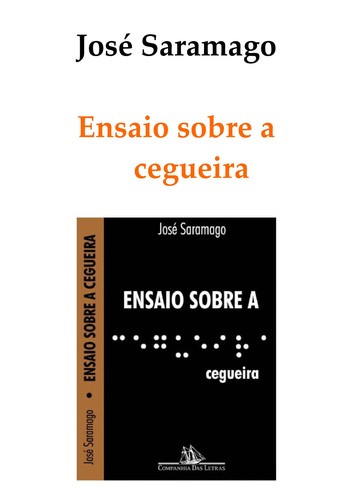José de Sousa Saramago, GColSE (Portuguese: [ʒuˈzɛ ðɨ ˈso(w).zɐ sɐɾɐˈmaɣu]; 16 November 1922 – 18 June 2010), was a Portuguese writer and recipient of the 1998 Nobel Prize in Literature. His works, some of which can be seen as allegories, commonly present subversive perspectives on historic events, emphasizing the theopoetic human factor. In 2003 Harold Bloom described Saramago as "the most gifted novelist alive in the world today" and in 2010 said he considers Saramago to be "a permanent part of the Western canon", while James Wood praises "the distinctive tone to his fiction because he narrates his novels as if he were someone both wise and ignorant." Bloom and Saramago met when Saramago presented Bloom with an honorary degree from the University of Coimbra; according to Bloom: "A warm acquaintanceship ensued, marked by an exegetical disagreement concerning The Gospel According to Jesus Christ, which continued in correspondence and at a later meeting in New York City".More than two million copies of Saramago's books have been sold in Portugal alone and his work has been translated into 25 languages. A proponent of libertarian communism, Saramago criticized institutions such as the Catholic Church, the European Union and the International Monetary Fund. …
José Saramago
Author details
- Aliases:
-
Жозе Сарамаго, خوسيه ساراماجو،, حوزے سارا ماگو, and 50 others
Saramago, José Saramago, ساراماجو، جوزيه،, Жазэ Сарамагу, Z'wzeh Saʾraʾmaʾgw, Ζοζέ Σαραμάγκου, होज़े सरमागो, ਹੋਜ਼ੇ ਸਾਰਾਮਾਗੋ, 주제 사라마구, Жузе Сарамагу, Sousa Saramago, Jūzīh Sārāmāghū, Žuze Saramagu, 若泽·萨拉马戈, ז׳וזה. טבעון מרים סאראמאגו, ஜோசே சரமாகூ, ساراماغو، جوزيه،, José De Sousa Saramago, جوز ساراماگو, ז'וזה סאראמאגו, ジョゼー サラマーゴ, Ժոզե Սարամագո, Жозе Сарамаґо, Joze Saramaqo, ژۆزێ ساراماگۆ, Сарамаго, ساراماغو، خوسيه،, Zhūzih Sārāmāgū, Сармаго, خوسيه ساراماجو, ჟოზე სარამაგო, ז'וזה סרמגו, ഹൊസേ സരമാഗോ, Zhoze Saramago, ジョゼ・サラマーゴ, ဆာရာမဂို၊ ဟိုစေး, Žūza Sārāmāgū, Ruoze Salamage, جوزيه ساراماجو, Iosephus Saramago, ژوزه ساراماگو, Ḵūsīh Sārāmāǧū, ジョゼ サラマーゴ, Jose Saramango, José de Sousa Saramago, হোসে সারামাগো, Ǧūzīh Sārāmāġū, Z'wzeh Saramagw, ז׳וזה סאראמאגו, Жазэ Сарамага - Born:
- Aug. 17, 1922
- Died:
- Aug. 17, 2010
External links
José de Sousa Saramago, GColSE (Portuguese: [ʒuˈzɛ ðɨ ˈso(w).zɐ sɐɾɐˈmaɣu]; 16 November 1922 – 18 June 2010), was a Portuguese writer and recipient of the 1998 Nobel Prize in Literature. His works, some of which can be seen as allegories, commonly present subversive perspectives on historic events, emphasizing the theopoetic human factor. In 2003 Harold Bloom described Saramago as "the most gifted novelist alive in the world today" and in 2010 said he considers Saramago to be "a permanent part of the Western canon", while James Wood praises "the distinctive tone to his fiction because he narrates his novels as if he were someone both wise and ignorant." Bloom and Saramago met when Saramago presented Bloom with an honorary degree from the University of Coimbra; according to Bloom: "A warm acquaintanceship ensued, marked by an exegetical disagreement concerning The Gospel According to Jesus Christ, which continued in correspondence and at a later meeting in New York City".More than two million copies of Saramago's books have been sold in Portugal alone and his work has been translated into 25 languages. A proponent of libertarian communism, Saramago criticized institutions such as the Catholic Church, the European Union and the International Monetary Fund. An atheist, he defended love as an instrument to improve the human condition. In 1992, the Government of Portugal under Prime Minister Aníbal Cavaco Silva ordered the removal of one of his works, The Gospel According to Jesus Christ, from the Aristeion Prize's shortlist, claiming the work was religiously offensive. Disheartened by this political censorship of his work, Saramago went into exile on the Spanish island of Lanzarote, where he lived alongside his Spanish wife Pilar del Río until his death in 2010.Saramago was a founding member of the National Front for the Defense of Culture in Lisbon in 1992, and co-founder with Orhan Pamuk, of the European Writers' Parliament (EWP).
